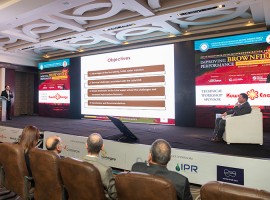By Mariana Somensi
The debate about the privatization of the Nigerian National Petroleum Corporation (NNPC) revived in January 2016 after Petroleum Resources Minister of State, Emmanuel Kachikwu, announced the country’s plans to make its first initial public offering of assets owned by NNPC in 2018.
The discussion gained force after Nigeria lost, for seven months, its position as Africa’s top oil producer to Angola, retaking it in December 2016 and losing it again in January 2017. Observers indicated that the government involvement in the oil and gas industry is a major cause of the sector’s problems, in addition to the militant attacks on the country’s pipelines, presenting privatization as the best alternative to boost NNPC’s performance.
In line with that, a ministerial address indicated that most energy infrastructure development projects should be financed and managed through private sector participation; hence, privatizing NNPC intends to restructure the public sector in order to substantially reduce the dominance of unproductive government investments in the field. It also looks to changing the orientation of all public enterprises engaged in economic activities towards a new horizon of performance improvement, viability, and overall efficiency.
Furthermore, privatization aims to send a clear message to the local and international community that a new transparent Nigeria is open for business, clearing the company’s mismanagement record.
Corruption and Mismanagement
The corruption in the organization and the mismanagement of NNPC is a major concern because the Nigerian economy relies solely on petroleum products. According to the Federal Ministry of Budget and National Planning, 95% of Nigeria’s exports earnings and 70% of the total federal revenue come from the oil sector.
In August 2015, NNPC faced one of its biggest scandals after an independent investigative analysis by the Natural Resource Governance revealed that over $32 billion oil revenue was lost to NNPC’s mismanagement of Domestic Crude Allocation (DCA), opaque revenue retention practices, and corruption-ridden oil-for-product swap agreements, as reported by Premium Times.
In March 2016, an official audit accused the company of not paying $16 billion in oil revenue to the Federal Government. After the incident, Former President, Olusegun Obasanjo, emphasized that NNPC should be privatized to end what he called “the monumental fraud” in the oil sector.
In January 2017, the company was once again the target of corruption allegations after oil marketers accused NNPC’s officials of extortion during the loading of petroleum products.
Revenue loss due to corruption sets privatization as an emergency measure, according to some specialists, but the situation has been further exacerbated due to ongoing militant attacks on the industry’s infrastructure, that render any emergency scenarios dubious.
Militant Attacks: An Issue to Consider
The militant attacks against Nigeria’s oil pipelines in the Niger Delta should thus be carefully considered before any attempt of privatization is made, since they have severely impacted the country’s production.
The militant groups first appeared in the early 2000s, claiming that oil-related activities held by foreign oil corporations have deteriorated the living conditions of people from the oil-rich areas. Moreover, ethnic groups argued they were being exploited as they could not benefit from the oil exploration in the region.
Given the nature of the groups’ resistance to the oil and gas producing activities, some analysts believe that the privatization plans for NNPC could further intensify the militant attacks on the oil and gas facilities. In July 2015, The Nation’s Columnist, Biodun Jeyifo, published his concerns that the privatization would increase the divisive and nation-wrecking struggles over which zones, which tribes, and which communities would get what percentage or share of the privatized oil corporation.
“In fact, already, there are whispers and rumors that the privatization of NNPC is intended to once and for all ‘solve’ the endless strife over ‘resource control,’” added Jeyifo. From his perspective, the privatization of NNPC may be unable to achieve the goal of stabilizing the country’s industry with non-state actors on high alert. As a matter of fact, it will likely instead exacerbate and raise the divisive struggles over the sharing of oil revenues between the different parts of the country to a new level. Hence, the mobilization against NNPC’s privatization has been a rather expected turn of events.
Mobilization against Privatization
The moves to privatize NNPC stirred up a lot of controversy in Nigeria, especially in the syndicates. In December 2016, workers in the oil industry under the aegis of Petroleum and Natural Gas Senior Staff Association (PENGASSAN) and the National Union of Petroleum and Natural Gas Workers (NUPENG) reinforced their opposition to the privatization and affirmed their positioning would be sustained as long as privatization discussions continue without proper engagement with the unions.
PENGASSAN Petroleum Industry Bill (PIB) Committee’s Chairman, Chika Onuegbu, who disclosed the position of the workers, said PENGASSAN and NUPENG would not accept a PIB that does not pay sufficient attention to the issues of labor with a guarantee of the rights to freedom of association and compliance with international labor standards and laws. According to him, the PIB proposed did not make reference to the collective bargain agreement.
Furthermore, speaking on behalf of the organized labor, Joe Ajaero defended their rights in the Nigeria Labor Congress (NLG) saying that “historically, no nation has had to sell off its treasures as a means of resolving recession.” He also explained that selling NNPC’s assets would represent a huge loss, since they guarantee the nation’s present and future as it provides the much needed resources to continue running the country.
Host communities under the umbrella of PAN-NIGER DELTA Forum (PANDA), led by Akwa Ibom State’s Former Governor, Victor Attah, also stated they would reject any PIB that fails to take into account host community funds. However, the organization expressed openness to embrace dialogue to address the age-long crisis that has compromised oil exploration in Nigeria’s oil rich Niger-Delta region.
In addition to the unions, stakeholders have also advised the Federal Government against privatization. NNPC’s Former General Manager and Finance, Victor Eromosele, who is also the M.E. Consulting Limited’s CEO, noted that privatization is not a solution to the problems of NNPC. He mentioned Statoil of Norway as an example of how the government can efficiently run a globally competitive company and equitably distribute wealth.
According to Eromosele, privatization can indeed solve some problems, but it also introduces others. As he explained, “there is a need to balance national sovereign control of natural resources with the need for efficiency and profitability.” In his opinion, the government should continue maintaining the ownership control of NNPC, but added it should equally allow it to be managed as an enterprise.
A Delicate Decision
Most recently, nonetheless, the Nigerian Federal Government clearly indicated its plans to sell NNPC’s assets. In February 2017, the state executives announced that Nigeria aims to generate up to $16.4 billion through asset sales in the next four years to reduce the burden on the nation’s budget. While the company’s privatization may remediate corruption and mismanagement to reinstate revenues lost to fraudulent activities on top managerial levels, it is important to consider all the available options before selling out the country’s main source of revenue – especially when a militant conflict has been holding production performance.








